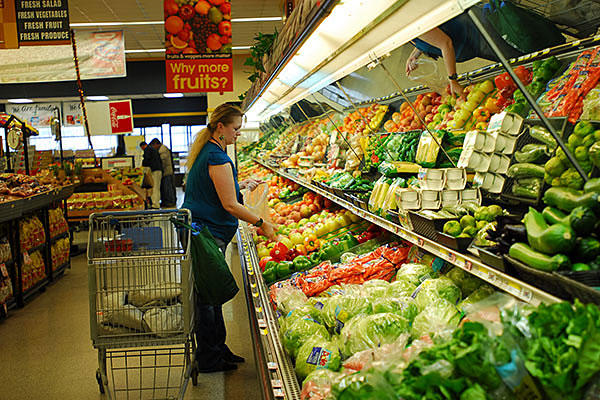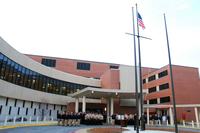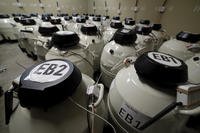One of the many benefits of military life is discounted shopping on base. While the on-base department store is known as the "exchange," the on-base grocery store is known as the commissary. And like most things in military life, it comes with its own quirks and rules.
You can make the most of your commissary trip and feel like an old pro whether it's your first time or 50th, by reading our handy guide. Here's everything you need to know about how to shop at the commissary:
Who can shop at the commissary?
The commissary, like most of the services on base, is reserved for certain people as a benefit of serving. You must have your ID card with you to buy your items. Sometimes, employees will ask to see your ID at the door and require you sign in adults without an ID as a guest. Other times, they will not. But you will be required to scan it at the checkout on every trip.
All kinds of military IDs are accepted at the commissary -- active duty, Guard and Reserve, dependents and retirees. As long as you have your military ID (don't forget it in the car!), you're good to go.
Starting in 2020 Purple Heart recipients, former prisoners of war and all service-connected disabled veterans, regardless of rating, as well as caregivers enrolled in the VA's Comprehensive Assistance for Family Caregivers program, can shop at Defense Commissary Agency stores and military exchanges. Read more on Military.com.
How is the commissary different from a regular grocery store?
Regular grocery stores operate to make money. The commissary, run by the Defense commissary Agency (DeCA), does not.
The commissary sells most items “at cost.” They negotiate this cost with the various manufacturers and then pass that price on to you, the shopper. That means prices frequently fluctuate, sometimes as often as every two weeks, based on what the commissary was able to pay for an item that cycle. The commissary is required by law to deliver a savings to shoppers over average prices found off base.
While a regular grocery store may put items on sale to get you into the store and eat the loss themselves, nothing is discounted by the commissary. Instead, the manufacturers decide what goes on sale. Strawberries may be sold at $.99 a carton today because that is what DeCA paid for them. A manufacturer may decide to sell cereal to the commissary for $1.50 a box instead of $3. That savings will always be reflected in the price tag in the store.
As part of a new effort the commissary system is permitted to sell commissary-brand items and adjust prices to be different from what the system paid to stock any given item.
Is there any way to tell what items are cheaper than usual?
DeCA posts all of its sale items categorized by store on its website. You must log-in with your first name, last name, birth date and last four digits of your social security number to access it. The list is organized by type of food or you can see "all sale items" at once in alphabetical order. You will be able to view the item name, size, percentage off and total price.
Why is there a 5 percent surcharge on my receipt? I thought this was tax-free.
While the commissary doesn't charge state or local food tax, they do levy a tax of its own -- the 5 percent surcharge.
Required by law, money earned by the commissary through the surcharge helps with store upkeep and construction of new stores. It is calculated by the cost of your items before coupons are deducted.
Can I use coupons at the commissary?
Absolutely -- but the rules are a little different at the commissary than in a regular grocery store.
The commissary accepts both coupons marked "commissary" and normal "manufacturer" coupons. However, unlike most grocery chains, they do not allow you to use both coupons at the same time. That means you need to pick the better one and use it instead.
The commissary also doesn't "double" or "triple" coupons the way some grocery chains do. What you see on the coupon is what you get. The commissary will, however, allow you to have what is known as an "overage." If you manage to use enough coupons that the store owes you money after you are done shopping, you can receive cash for any amount owed below $25. For a payout larger than that, the commissary will give you gift cards.
The commissary also has its own electronic coupon program called the commissary Rewards Card, but again, you have to use a paper coupon or an electronic one -- not both. The card program is somewhat confusingly named since it doesn't give you any rewards beyond the coupons themselves. You can load coupons to the card online.
If you're using a coupon at the commissary in the United States, you need to use it before the expiration date. However, at overseas locations (not including Hawaii and Alaska), you can use coupons up to six months after they expire.
You can see the commissary's coupon policy here.
Does the commissary sell bulk items?
Most commissaries feature a small bulk item area in the store where you can find larger than normal boxes of diapers, soap, cereal or other items. Some stores also have an area of the freezer section dedicated to a small variety of cold items.
One store, however, has an entire special "Club Pack" section. The store on the McChord side of Joint Base Lewis-McChord, Washington, is home to a "Commissary Club" pilot program where shoppers can purchase large packs of many items much as they would at Costco or Sam's Club.
What is a 'case lot sale?'
The commissary periodically hosts bulk item sales known as "case lot sales" in the parking lot. These events are held a few times a year at most bases. The agency also hosts these special sales at Guard and Reserve locations nationwide.
You may be able to find items at better than normal prices at the case lot sale and items sold in bulk not normally carried by the store. That's because the manufacturers negotiate a special sale price for these commissary events. But items are not always cheaper at a case lot event than they are throughout the year inside the store.
Am I supposed to tip the baggers?
While most baggers at grocery stores off-base are not allowed to accept tips, baggers at the commissary receive no salary and are paid only in the tips you and other shoppers give them.
There's a lot of debate within the military spouse community over exactly how much is enough to tip a commissary bagger. According to some shoppers, the tips they pay range anywhere from between $2 and $5 a trip. Some shoppers base what they tip off how much they spend at checkout, while others give a flat rate regardless of what they just spent.
You can always choose to take your groceries out yourself or use the self-checkout and bag your own order.
Using the commissary is a great way to take advantage of a military benefit designed to save you money on groceries. Happy shopping!
Keep Up with the Ins and Outs of Military Life
For the latest military news and tips on military family benefits and more, subscribe to Military.com and have the information you need delivered directly to your inbox.






















